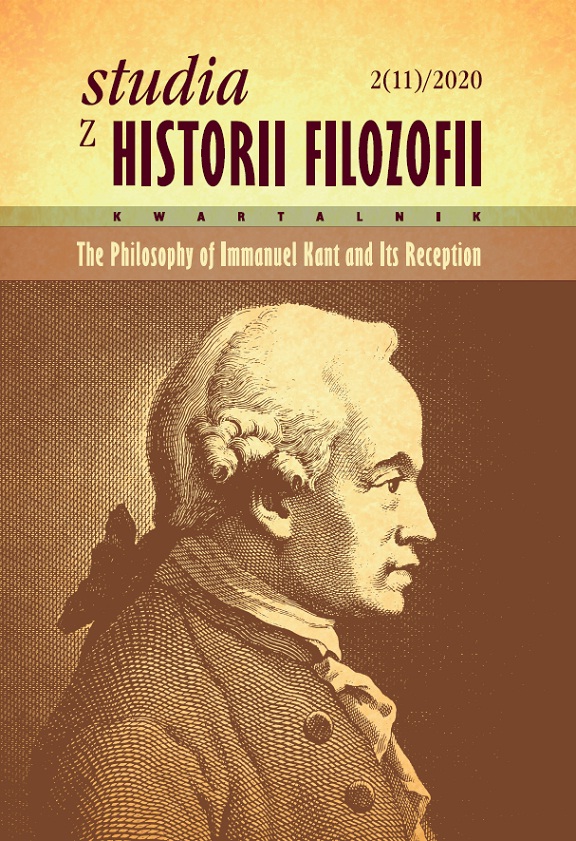Immanuel Kant and the Pragmatic Turn of Science Through the Prism of Sergei Bulgakov’s Metaphysics
DOI:
https://doi.org/10.12775/szhf.2020.011Słowa kluczowe
unity of science, relativism, conventionalism, Russian religious thought, Sophia, humanity, transcendental subjectAbstrakt
In the early 20th century, science reveals its instrumental and conventional character. These pragmatic features, according to Sergei Bulgakov, underscore the dependence of scientific claims on human qualities and purposes. Science is anthropologised; therefore, philosophy of science can be regarded as a part of philosophical anthropology. The pragmatic turn of science, Bulgakov argues, had a Kantian impulse. In 1912 book “Philosophy of Economy”, Bulgakov advances a metaphysical view on science in a dispute with his critical interlocutors – Hermann Cohen, Paul Natorp, Heinrich Rickert, and their prominent predecessor Immanuel Kant. This paper shows that despite a fundamental disagreement concerning the notion of the transcendental subject, Bulgakov does not disprove the utility of Kant’s transcendental theory of knowledge. He rather points out the limits of this theory (Kant primarily insisted on) and overrides those limits as dispensable for philosophy, which does not have to be a formal science.
Bibliografia
Bulgakov Sergei N. 1994 [1917]. Svet nevecherniy: Sozertsaniya i umozreniya. [Unfading Light: Contemplations and Speculations]. Moscow: Respublika.
Bulgakov Sergei. 2000 [1912]. Philosophy of Economy. The World as Household, transl., ed. and with introduction by Catherine Evtuhov. New Heaven and London: Yale University Press.
Bulgakov Sergej N. 1927 [1920]. Die Tragödie der Philosophie. Darmstadt: Otto Reichl Verlag.
Bulgakov Sergiy. 1971 [1912]. Filosofiya hozyaystva [The Philosophy of Economics]. Part 1. The World in Terms of Economics. Upper Saddle River: Gregg International Publishers Ltd.
Cohen Hermann. 1883 [1876]. Das Prinzip der Infinitesimal-Methode und seine Geschichte: ein Kapitel zur Grundlegung der Erkenntniskritik. Berlin: Dümmler.
Cohen Hermann. 1885 [1871]. Kants Theorie der Erfahrung. Berlin: Dümmler. d’Espagnat Bernard. 2013. On Physics and Philosophy. Princeton and Oxford: Princeton University Press.
Gomes Anil. 2014. “Kant on Perception: Naive Realism, Non-Conceptualism, and the B-Deduction”. Philosophical Quarterly 64, 254: 1–19.
Heidegger Martin. 1992. History of the concept of time. Prolegomena to the Phenomenology of History and Nature. Transl. Theodore Kisiel. Bloomington and Indianapolis: Indiana University Press.
Kant Immanuel. 1998. Critique of Pure Reason. Transl. and eds. Paul Guyer and Allen Wood. Cambridge: Cambridge University Press.
Kant Immanuel. 2004. Prolegomena to Any Future Metaphysics That Will Be Able to Come Forward as Science: With Selections from the Critique of Pure Reason. Transl. and ed. Gary Hatfield. Cambridge: Cambridge University Press.
Kumar Apaar. 2016. “Transcendental Self and the Feeling of Existence”. Con-textos Kantianos. International Journal of Philosophy 3: 90–121.
Lovejoy Arthur O. 1909. “Pragmatism and Realism”. The Journal of Philosophy, Psychology and Scientific Method VI: 575–580.
Natorp Paul. 1910. Die logischen Grundlagen der exakten Wissenschaften. Leipzig: Teubner.
Palágyi Melchior. 2010 [1903]. Die Logik auf dem Scheidewege. Whitefish: Kessinger Publishing.
Plato. 2006. The Republic. Transl. R. E. Allen. New Haven: Yale University Press.
Poincaré Henri. 1902. La science et l’hypothese. Paris: Ernest Flammarion.
Rickert Heinrich. 1902. Die Grenzen der naturwissenschaftlichen Begriffsbildung: eine logische Einleitung in die historischen Wissenschaften. Tübingen, Leipzig: J.C.B. Mohr (Paul Siebeck).
Saldanha Arun. 2009. “Back to the Great Outdoors: Speculative Realism as Philosophy of Science”. Cosmos and History: The Journal of Natural and Social Philosophy 5, 2: 304–321.
Wazeck Milena. 2014. Einstein’s Opponents: The Public Controversy about the Theory of Relativity in the 1920s. Transl. Geoffrey S. Koby. Cambridge: Cambridge University Press.
Pobrania
Opublikowane
Jak cytować
Numer
Dział
Statystyki
Liczba wyświetleń i pobrań: 810
Liczba cytowań: 0



